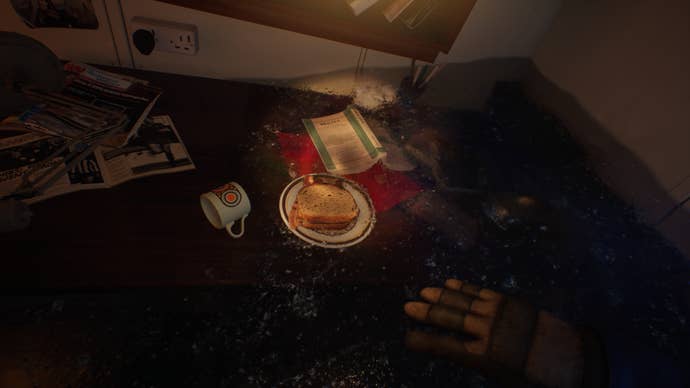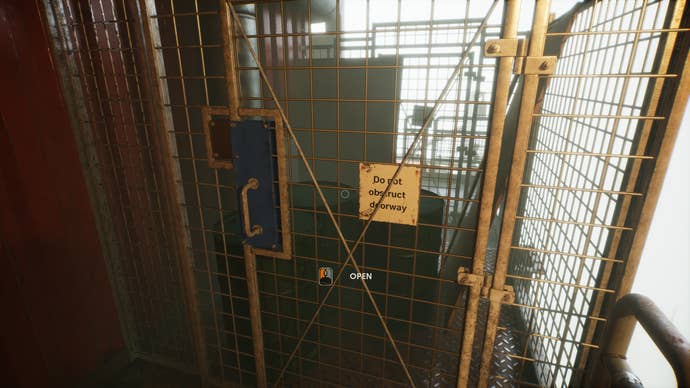Products You May Like
First of all, Still Wakes the Deep is an incredible artistic achievement. It may be The Chinese Room’s best ever game, blending the tense creeping horror of Amnesia: A Machine for Pigs with the evocative, beautifully researched world-building of Dear Esther and Everybody’s Gone to the Rapture.
And there are familiar themes here: a sense of weariness about industrialisation, remote places that howl with the absence of far away loved ones. A shockingly effective sense of place that grounds the whole thing. Whether or not you have any lived experience of Scotland in the 1970s, Still Wakes the Deep will make you believe you do. But I think it could have been bolder. More on that later.
Along the East Coast of Scotland there can be found some of the most beautiful places on Earth. Soaring cliffs topped with the ruins of forgotten castles. Sleepy villages hidden away from the world as they nestle in the crags of natural harbours. Every town having a big successful chippy that all the tourists go to, and the small, actually good chippy off the main street that all the savvy locals go to. Arbroath, with its grin-inducing duality of being a location of great historical importance, where kings were made, and also the host of Pleasureland, a comically dilapidated indoor amusement park that feels like a living Reeves and Mortimer sketch.
It is a land of juxtaposition. Outstanding beauty pockmarked by monuments to tragedies both recent and long slipped from living memory. Visit places like Eyemouth or St. Abbs (known better to you as New Asgard, probably) and you’ll find shrines to cholera victims built from the gravestones they had to exhume in order to make room at the cemeteries. A series of bronze statues commemorate the East Coast fishing disaster of 1881, in which a biblical storm claimed hundreds of fishermen’s lives, leaving a fatherless generation stranded in one of the most brutal times in history to raise a family as a single woman. The statues, called Widows and Bairns, do not commemorate the men lost, but rather the women and children left to pick up the pieces without a breadwinner. In a way, the poets lament, the men who died were the lucky ones. They didn’t have to figure out how to carry on.
Following Scotland’s oil boom of the late 60s/early 70s, a new type of tragedy emerged to haunt the not-yet widows and bairns of those workers tempted out to iron islands in the middle of the North Sea by danger money: oil rig disasters. The most famous and perhaps most consequential of these is the tragedy of Piper Alpha, a single 1988 incident which claimed almost as many lives as the entire East Coast fishing disaster did a century earlier. It’s similarly memorialised in bronze in Aberdeen, and more morbidly as a wreck buoy marking the remains of the rig – once the most productive on the entire planet – sitting a visible distance away from Piper Bravo, its modern replacement. Serving, no doubt, as a regular reminder to today’s North Sea workers that they do in fact have one of the most dangerous jobs on the planet. If you look up oil rigs on YouTube, you’ll find dozens of shorts entitled things like “why are oil workers paid so much?”. This is the wrong question.
There’s an authenticity to Still Wakes the Deep that is its most endearing and compelling feature. The opening twenty minutes – where you do little but wake up, walk across the rig, and get a bollocking from your boss – is probably the best sequence in the entire game. Not because the rest of it is bad, but because this is where you experience normal life aboard one of these installations. Meeting several of your colleagues. Joining in with their morning chats as they chow down on extremely realistic looking plates of eggs, beans, toast, and sausage. It’s in these opening minutes that the game’s overriding theme becomes apparent: masculinity, of the toxic variety. A latent aggression that underpins almost every encounter.
It’s an accurate depiction of Scotland’s oppressive social contract, with its golden rule of Thou Shalt Not Care. A nod to the SNP’s ‘It’s Scotland’s Oil’ slogan is made by Trots, your bespectacled trade unionist colleague whose nickname betrays his status among the group: a riddy. Kind of a joke. Don’t get that fud started on worker’s rights, you’ll be there for hours, etcetera. A big bald prick called Addair menaces you over a plate of toast. You trade barbs, ridiculing him in the moment, winning for now the battle for your peers’ respect. I particularly enjoyed that one because I went to school with a big bald prick called Addair who once menaced me while eating a bacon roll.
Of course these interactions serve a narrative purpose: they foreshadow many of the harrowing encounters that shape the game later on. But they’re extraordinarily well written vignettes that do a lot of the heavy-lifting with regards to world building, making up for the fact that setting your game on an outcrop of scaffolding hundreds of miles off the coast of Aberdeen isn’t conducive to getting across that these guys are seventies men from a seventies world. Imagine 200 of them crammed into an accommodation deck. You can smell it. Dozens of guys in overalls eating baked beans and reeking of halitosis, and shite. That’s true horror.
_wsPpe6I.png?width=690&quality=70&format=jpg&auto=webp)
Which sort of brings me around to my chief complaint about Still Wakes the Deep: for all its astounding production values, sumptuously written dialogue, and unrelentingly tense atmosphere, the actual game bit is fairly derivative. A selection of boiler-plate horror mechanics have been cribbed from elsewhere to make up a bulk of the busy work here. Strategically placed lockers to hide in as your current antagonist slithers its way around a dimly lit level, for example, straight out of Alien Isolation. The visceral click-clunk of all the equipment you must press X to operate, timed to perfection to suspend your control of the camera for just long enough that by the time the bottled animation is over, you are screaming internally to be able to have a quick look around. Few games have actually gone the extra step of having something attack during these moments of extreme vulnerability, but just the threat is enough to keep you on edge.
Yes, it’s a walking sim, a busywork sim, and a hiding sim. Though they’re executed well, there’s nothing especially bold about these elements that make up the game part of this interactive disaster movie. And truth be told, the story’s reliance on an awakened supernatural force also feels fairly humdrum in a world filled with games that have mutated monsters. Anguished human faces peering at you from writhing masses of oozing flesh and tentacles. Said abominations patrolling in set paths around an environment filled with hidey holes so you can get past them with relative ease. The thing about this scary game is that it isn’t particularly scary. Anyone vaguely familiar with the genre will find it distinctly unchallenging. In gameplay terms, but also in how humdrum the biomatter threat is.
Here’s the thing: being on a normal un-disastered oil rig is a f**king terrifying prospect. You don’t need to wrap the thing in horrid gloop that turns your mates into eldritch abominations to make it a distinctly unpleasant place to be. It’s an impossible outpost of civilisation perched on an outcrop of rust in the middle of the sea. Far from the domain of apes. We shouldn’t be there. We send people there because the energy demands of our vast science-fiction society – with its gigantic glass towers and tiny glass rectangles – are insatiable. The price is that it’s so damn close to impossible to sustain all of this that all the procedures involved are bloody dangerous.

This could have been a great disaster game about the very real phenomenon of oil drilling going wrong. In the distinctly ‘elf and safety-averse time period in which it is set, the spectre of lax precautions and lapsed maintenance schedules was much more prevalent than it is now. Overworked engineers being bullied by impatient bosses into cutting corners is a matter of historical record. Hubris is a real monster that exists. Couching it in Cronenbergian literalism just dilutes the point. The boss that bollocks you at the start of the game (with good reason, as it happens) ends up as a corrupted flesh horror with a gigantic head. That’s about as on-the-nose as calling a game about insomnia Alan Wake.
I wish it was bold enough to eschew the silly blob monsters and just be a six-hour disaster story about trying to keep an oil rig from sinking or blowing up after a rupturing explosion. Partly because it basically is that. And I think there are smarter, less incongruous ways to introduce the various story elements that keep it chugging along – the ever disappearing prospects of escape, the hostile actors trying to hobble your progress – without going down a path of cribbing from Every Recent Horror Game.
That said, as an overall package, Still Wakes the Deep is an arresting work that is superbly put together. The level of talent involved is undeniable: the voice acting and direction in particular is pivotal. With the protagonist Caz’s words ringing in your head as if they were your own, you feel every shortness of breath, every anxious gasp, every expletive that’s shotgunned across the deck in that inimitably Scottish way (fans of the C word should get a kick out of this game). It’s the kind of tactile viscerality that proves how much of a gimmick VR is. Yes, you could argue that this game is a prime candidate for a VR conversion somewhere down the line (it wouldn’t surprise me if it started out as VR exclusive, but became a traditional 2D game because people like paying their bills), but the immersiveness that it pummels your cerebral cortex with if you just let it happen to you via a big telly and a set of decent cans is enough to prove that storytelling and artistry are what pulls you into a game world, not a stupid hat.
In the end, Still Wakes the Deep is worth the six or seven hours it takes to blast through the story. It’s not scary as such, but it’s tense as hell, and there’s a poignance here that shines brightly through the veneer of soot, and gloop, and toxic masculinity What this game is really about, just like that bronze monument in Eyemouth, is the widows and bairns left behind.
Still Wakes The Deep releases on June 18 for PS5 5, Xbox Series X/S, and PC. It was reviewed on PC using a copy provided by the publisher.
